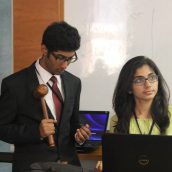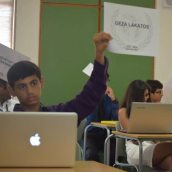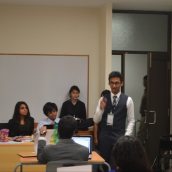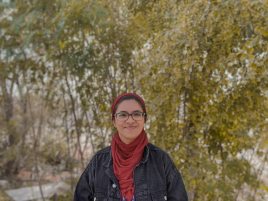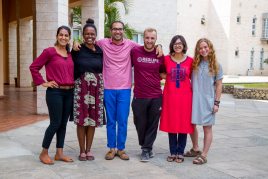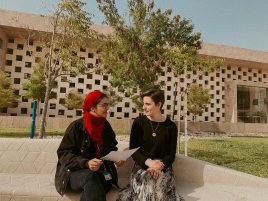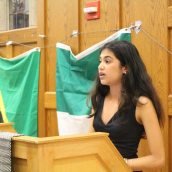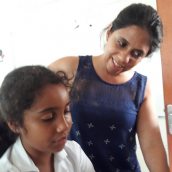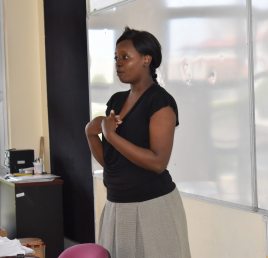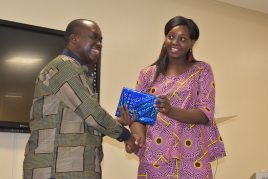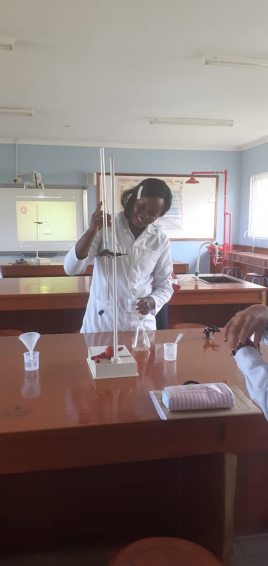Swim coach, K. Surendra, wins 4 golds
Hyderabad swim coach wins at Telangana Swim Masters Championships, moves on to nationals in October 2018.
Academy hosts Metro MUN - 8th-10th December 2018
Over 200 students from more than 10 Hyderabad schools will participate in debate sessions at the Academy.
Election holiday - Thursday 11th April 2019
AKA Hyderabad will observe a public holiday in connection with polling for the Lok Sabha elections.
Rising Beyond: Inspiring Debate at the MUN
The simulation opened with an aesthetic dance performance showcasing culture that exists in great depth, as well as having Birad Yajnik speaking about global citizenship and leadership. The opening ceremony was followed by the first session of this simulation which consisted of students prepared for heavy debate.
The first session was preliminary and introduced the agendas and topics of debate of each committee to all the delegates. DISEC (Disarmament and International Security Committee) was engaged in debating over the international intervention in Civil Wars; ECOSOC (Economic and Social Council) debated over the impact of science, innovation and technology in achieving the millennium development goals; the JCC (Joint Crisis Committee) went back into history and debated over issues concerning World War II; and lastly, we had the Press Corps which interacted with each committee and their delegates of the conference, and got intensely rooted in the simulation, in order to provide for a very holistic experience of the whole event that took place.The second day still carried on with the same passion and enthusiasm. The second session started off with a morning crisis update, which proved to be quite a surprise to all the delegates. However, the debates in each committee over the crisis initiated slowly, and later escalated into deeper and effective discussions. The Press were involved in initiating Crisis in each committee which proved to be operative as it provoked heavy debates and discussions, further on the day. The second day proved to be an ecstatic and progressive one as it stimulated every mind, which resulted in exciting preparations for resolutions for the last day. The Delegate Dance was of course one of the highlights of the second day of the simulation.
Eventually came the final day of the simulation. The day proved to be brief but tense as delegates of each committee had to come up with effective resolutions according to their agendas. Every committee except for JCC (as it was historical) and DISEC succeeded in coming up with resolutions. Although DISEC failed to pass a resolution, it still instilled the sense of intrigue, passion and enthusiasm to overcome problems that are faced on the surface of the planet – each day and every moment.After having come up with a variety of resolutions, the time for closing the simulation had come. This time was much awaited by the delegates as it was also an award ceremony. Titles such as “Best Delegate”, “Outstanding Delegate”, “Best Photographer” and “Best Reporter” echoed the halls of the venue wherein the ceremony took place. After having a hearing of speeches of inspiration and accomplishment by the Security General and the Executive Board, as well as teachers and staff who functioned as a backbone to the simulation; and watching proud delegates walking towards their much deserving awards, came the time of saying a proud goodbye to the Aga Khan Academy, Hyderabad’s second edition of the Model United Nations conference. Now awaits the third edition which shall happen in Fall, 2015.
By Akanksha Dev
Samantha Caras: Pioneering new approaches to University Counselling
Samantha Caras is from Southern California in the United States and has worked as a University Counsellor at the Aga Khan Academy Mombasa for four years. Her budding journey first began in India where she worked as an Academy Fellow for a year at the Aga Khan Academy Hyderabad supporting the leadership curriculum, helping out with college essay writing and teaching yoga before embarking on her role as a University Counsellor.
During her five years with the Academies, Samantha said her work changed the trajectory of her professional and personal life.
“It showed me that small opportunities, like being sent to a conference can change the course of your life,” Samantha said.
After being mentored in AKA Hyderabad, Samantha set out on a whirlwind experience at AKA Mombasa as a full-time University Counsellor.
“Coming to Mombasa has been exciting because I was able to have a lot of ownership over my work and could structure the office however I wanted,” Samantha said. “The flexibility and creative license I was given allowed me to build and restructure the university counselling programme to fit the diverse needs of our students.” She also said she enjoyed being immersed in many cultures, owing to the diversity of the school, and making friends from all over the world has helped her gain an overseas family for life.
Samantha said what she will miss the most is working closely with the students on their essays, being a part of High-achieving, Low-income (HALI) Access Network (an association of non-profit organisations in Africa that work with high-achieving, low-income students to access international higher education opportunities) and living in beautiful Mombasa. She also said she’s learnt quite a lot professionally, especially about the role of culture and background in higher-education advising.
During her time and position at the Academy, Samantha achieved quite a lot. On a personal level, she managed to finish her Master of Education in International Counselling Psychology, after which she got Minal Shah, the head of student support and well-being, to help her out with a professional internship. For the University Counselling office, Samantha managed to change the structure of the programme to include weekly lessons on topics such as writing a resume; professional communication; writing college essays; mock admissions game; applying for financial aid and scholarships; money matters; budgeting and cost of living abroad; adjusting to life after the Academy; and developed the presentations for these lessons. She also applied for the Academy to become a member of the HALI Access Network, which has increased its visibility and given it access to numerous resources and scholarship opportunities for the Talent Identification programme students over the past four years. Additionally, she contributed to the early drafts of what is now the University Counselling Handbook for the Academies network, set up the office’s social media page on Facebook, and worked with USA-based Ismaili volunteers to develop a sustainable standardised assessment test (SAT) programme for college admissions.
Minal describes Samantha as a warm, open and candid individual who worked well with the students.
“Samantha has built significant bonds with the students she’s worked with,” Minal said. “She always encouraged and pushed the students, who always appreciated her patience, honesty and sense of humour. I will miss working with her and her enthusiasm of making things right for the students. She will be a wonderful addition to any institution she joins.”
For her next plans, Samantha said she will be moving to Quito, Ecuador to work as the college counsellor at an international school.
“It was a difficult decision to leave Mombasa and the Academies, but I am excited for the new experience and to work on my Spanish language skills again,” Samantha said.
Aleesha Suleman (Class of 2012): Dedicated and determined
At UCL- Qatar, Aleesha is completing a Master of Arts Degree programme in Museum and Gallery Practice. This programme, Aleesha says, “brings together my many loves – art, museums, culture, education, development and social justice.”
Aleesha also has a Bachelor of Science degree in Foreign Service from Georgetown University in Qatar. She notes that whenever she was studying, she never lost sight of her connection to Kenya.
“For one, whatever classes I took, I would find ways to connect my research back to Kenya, its history, its politics and its socio-economic issues. University classes related to the African continent would light a spark in me that made me realise how passionate I was about making a positive social change to the continent in whatever way I could,” she states.
Being admitted to the Academy was the beginning of a transformative journey for Aleesha. Coming from a more conservative background, it was a culture jolt initially. “I distinctly remember feeling the shock of a co-ed classroom for the first time and feeling like I would never be comfortable in the Academy’s school uniform.”
However, as Aleesha began to be exposed to a plethora of experiences, she adjusted quickly to her new life. She engaged in a number of extracurricular activities, including singing and playing musical instruments for the school band, hiking and mountain climbing through the President’s Award Programme. She also took on a leadership role within the growing residential programme as a Dorm Captain.
Following her graduation from Georgetown University, Aleesha returned to AKA Mombasa to become an Academy Fellow for two years. During this time, Aleesha worked as a mentor and residential parent to students, while also working in the Communications Department. Once her fellowship ended, Aleesha became the Communication Department’s official Communications Officer.Always a champion of social enterprise and progress, Aleesha started an organisation called Kreatives Konnect when she became a part of the Academy staff. The focus of the organisation is to provide opportunities for creatives in the coastal city of Mombasa to showcase their talents, network and collaborate with others, while also co-creating opportunities for development. Not only did the staff at the school back her in this endeavour, but the Academy students and the wider AKA community also helped her make this vision a reality.
“It made me feel very privileged to be part of such a community,” Aleesha recalls proudly. “I realised that just as the Academy supports students in making their ideas come to life, the school also supports all projects that impact the broader society.”
What does Aleesha envision she will do for Kenya?
“My long-term goal is to build high quality, accessible creative spaces in Kenya, specifically in my hometown of Mombasa. I hope to establish start-ups around this idea, incorporating the ground-work already started through Kreatives Konnect.”
A firm believer in the power of good art bringing about social change and moving communities forward, Aleesha says her goal is to work with artists to raise the level of development of the country in a sustainable manner. “I would like to work on creating cultural policy and instituting cross-cultural collaborative programs that would revolutionise the creative industry, not just at a local level in Mombasa, Kenya, but also at a regional and international scale.”
Aleesha recently worked on an interactive online exhibition with her Museum and Gallery Practice colleagues. It is titled Umoumah: Becoming a Mother and takes the visitor on a journey through pregnancy and motherhood, especially focusing on how the mother can be supported by loved ones and most importantly, herself. Aleesha sees this project as a crucial learning experience in how support and positive social change can be achieved through digital platforms. “Especially now with COVID-19, we’re all having to find alternative ways of communicating and connecting with others, and having a fully online exhibition is simply a testament to that. It opens up a lot more cross-border avenues for the future that transcend physical constraints.”Aleesha has fondly come to regard the Academy as her second home. Reminiscing about her period at the Academy, she offers a bit of advice to current Academy students.
“Be highly proactive. Do your research. Learn about yourself. Keep your options open and stop letting other people define the next steps of your life. Don’t be lazy about this process because it defines the next few years of your life. No one is going to just hand you things – you have to work for it. There are lots of amazing young people around the world who are deserving (especially if you’re looking for scholarships) You have to show the admissions team why you are unique, but there has to be evidence to show this. This evidence comes through your active and consistent participation in the activities and causes you truly care about.”Ruhi Kamal Manek (Class of 2016): Advocating for Africa
Ruhi Kamal Manek, an alumnus of the Aga Khan Academies in Mombasa and now a sophomore at Yale University in the United States, took away one enduring lesson from the Academy: the importance of engaging in thoughtful and careful consideration of diverse opinions. She explains that it was her time at the Academy that forced her to reexamine her old-world views and believes that her new way of thinking as a citizen of the world was borne of her stay in residence at the school:
“Living with people from so many diverse backgrounds helped me appreciate differences in people. This experience further helped me feel comfortable interacting with people from diverse backgrounds and diverse cultures at Yale.”
Ruhi was born in Nairobi, Kenya and grew up in the small town of Eldoret. It was her desire to learn and challenge herself more that made her apply to the Academy.
“I could not think of a better place to do that than at the Academy,” Ruhi states. “Being admitted to the school was the beginning of a transformative journey for me - a defining moment in my academic and personal life.”
The Academy places immense importance on meaningful public service. Ruhi participated in numerous voluntary undertakings but it was involvement in the annual school-based deworming program in the impoverished Bombolulu area of Mombasa that had a lasting impact on her. Under this program, school children receive an oral dose of deworming medicine designed to lower their risk of infection by worms and thus enhance their health and school productivity.
“The experience opened my eyes,” Ruhi says. “The thought that something so trivial as administering a few drops of medicine in a child’s mouth can transform that child’s future was inspiring to me.”
Involvement in this program inspired Ruhi in many ways. Watching the children joyfully engage with life forced her to reflect on values of humility, modesty and gratification:
“As I stood among the children, I felt as though my heart had grown twice as large, making space for these beautiful souls. I was filled with an inexplicable amount of joy as I marveled at the contentment and optimism around me. Despite the conditions in which the children lived and learned, they were radiating with happiness. I was in awe. The whole experience reminded me of a quote by the Buddha: ‘The cessation of desire is the cessation of suffering.’”
After this experience at the Academy, Ruhi continued her volunteer work at Yale. She is part of the TEDxYale team and helps to organize seminars and conferences. She is a member of Yale UNICEF and is involved in fund-raising efforts to make a difference in children’s lives globally. Committed to women’s rights regarding education and leadership roles, Ruhi also joined the Yale chapter of the Circle of Women, a non-profit organization “that educates, inspires and empowers women to become leaders and peacemakers.”
Additionally, Ruhi is involved in developing a wellness curriculum for a girls’ secondary school in Orkeeswa, Tanzania, which promotes the ideas that healthy students are better learners and that focusing on wellness now can produce huge intergenerational benefits.
“My first year at Yale has undoubtedly been enhanced through my participation in activities that I have long been passionate about,” states Ruhi. She unequivocally credits the Academy’s International Baccalaureate (IB) curriculum and the residential program for her growth and personal development. “My journey at the Academy was one of the most intense yet fulfilling growth periods of my life. I think it is safe to say that it played a key role in helping me develop the person I am today.”
When asked what her aspirations are for the country of her birth, Ruhi radiates determination. “I want to help redefine the way in which the rest of the world views my country, and more particularly the African continent. I want to be an active agent in ensuring that our stories are no longer told for us but by us.”
She is also determined to promote education in her country. “I want to tackle the issue of the lack of education. I value nothing more than the education I have been so privileged to receive and the many opportunities that have come my way because of it. I wish to help provide the same for as many people as I possibly can in my country of origin and beyond.”
By Perviz Walji
Newsletter readers please click here to return to the newsletter (browser version)
Nuala Alibhai: Enriching educational and social programmes at the Academy
“The Academy through the International Baccalaureate curriculum has earned a positive reputation for its pluralistic approach, providing a holistic learning environment, developing leaders and achieving educational excellence.”
Nuala Alibhai is the Learning Student Support Coordinator for junior and senior schools at the Aga Khan Academy Mombasa. In this role, she works in collaboration with the Academy’s Principals to develop on-going systems of support for the student community. This includes providing leadership, management and advice on inclusion within the school to develop a differentiated programme that both challenges and meets the needs of students. She also ensures that the Student Support Unit effectively identifies students with any needs for additional support need, including gifted and talented, as well as vulnerable students.
She was born in Kenya where she acquired her basic education. She obtained her undergraduate degree from University College London as Speech and Language Therapist. Later she pursued her Masters in Inclusive Education, at the University of the West of Scotland where she completed her research in inclusive education at the early years level.
At the Aga Khan Academy Mombasa, Nuala works on a Value-based Education Programme, as a Curriculum Designer, through the Professional Development Centre at the Academy. She came to the Academy with a diverse background in inclusive education at a school, community and public policy level. “I was keen to apply this knowledge and skills within a mainstream school setting, to enable every student to achieve and succeed in school, career and life,” she remarks.
It has been Nuala’s endeavour to improve social outcomes through strategic planning and capacity building at the local government and community level. She is also passionate about designing and developing alternative educational programmes for vulnerable children, in order to ensure that they realise their full potential, so they can succeed in life as dignified equals. She has achieved both of these objectives by working for the past 15 years as a speech and language therapist and as an educational consultant in both the private and public sectors in Kenya and the UK.
Since September of 2016, Nuala has been with the Academy and appreciates how the Academy has provided her with opportunities to develop her teacher training skills and curriculum development skills. Nuala says, “I enjoy working with teachers who bring their hands on experience in the classroom and subject relevant knowledge to the table so we can enrich the educational and social programmes at the Academy.”
When asked what led her to choose a career in teaching, Nuala replies, “Karma! I started my career as a health professional but on my return to Kenya, I was sought after to do training, policy work and change management in the education sector. As my experience and confidence in the area grew, I began specialising in education. I have always seen myself working with children, so education was also an attractive choice.”
According to Nuala, the International Baccalaureate (IB) curriculum and the Aga Khan Academy strands set the Academy apart from other educational institutions. “It is one of the few schools in Kenya that offers the IB curriculum, which I consider to be the gold standard in education because of its holistic approach, academic rigor and emphasis on community service. The strands are added dimensions that help students make better sense of themselves, others, the world around them and the interconnectedness of all these elements.”
In terms of ensuring a climate of pluralism on campus where students from different racial, ethnic and faith backgrounds work together, Nuala feels the pluralism strand is already integrated into the lessons in the classroom, extracurricular activities after school and during out of school activities. “Collaboration skills are one of the approaches to teaching and learning, so students are exposed to activities that encourage and enable them to work with others who are different from them and have different opinions than them. They are encouraged to listen to others respectfully and consider their perspectives. This builds communication skills and empathy in students. These skills are then transferred to the student’s day-to-day interactions and not only in the classroom,” she reiterates.
When asked about the most rewarding aspect of teaching at Aga Khan Academy Mombasa, she replied, “The collaborative spirit and practice amongst the staff.” She further adds that there is appreciation and inclusion of every individual’s knowledge, skill and experience in decision-making. According to Nuala, strategies and unit plans are collectively produced not only to enhance the quality of the teaching and learning experience for the student, but also to allow the adult to grow, as a professional, in the process. “The teachers on the whole are approachable, warm and a joy to work with,” she comments. Parents are also involved as much as possible in their children’s education, she mentions. Parents get regular updates from the school on their child’s progress and well-being and are given recommendations of how to extend the learning and support beyond the walls of the school, she adds.
Nuala strongly feels that her position at Aga Khan Academy Mombasa has given her the opportunity to individualise the learning for every student. “My prayer is that this opportunity helps them become more self aware, reveal their talents and inspire them to make bigger strides forward with direction and confidence.”
Fiona Makena Kinyua: A transformed educator
“I was elated,” she says. “There were twenty graduates who made it to the final phase. I was one of them. It made me very happy because the TPP programme is very competitive.”
TPP, a multi-phase programme, was designed by the Academies to train outstanding graduates from public universities to teach one or more of the International Baccalaureate Programs (IB) schools. The initial component of the three-part programme, Choosing to Teach Institute was launched in Mombasa in 2013. This was followed by the other two components: Learning to Teach Internship and Teaching to Learn Residency. Today, the Programme is taught in all three academies.
The aim of TPP is to train teachers to become transformative educators in their communities with the vision, as the programme states, “to provide exceptionally talented and highly motivated Academies students with a rigorous academic and leadership-development experience.” The skills the trainees gain from completing any component of the programme are considered highly valuable, thus raising academic standards in the schools in which they teach.
Armed with a Bachelor’s degree in Education Science, Fiona completed the TPP training in June 2019, and currently teaches mathematics and chemistry at the Naisula School, Kajiado County in Kenya. Highly motivated and ambitious for her young students, Fiona says it is her training with TPP that drove her to change her education approach. Her instruction is now entirely student- centered, she states proudly. She has whole-heartedly embraced inquiry-based instruction to engage her students and uses the education concept of differentiation to tailor her lessons to meet individual needs.
Fiona Makena Kinyua with TPP Coordinator Tom Abuto“I thank the TPP fraternity for the opportunity to train as an International Baccalaureate teacher. My teaching methods have changed. I remember initially I had a challenge in facilitating an inquiry-based lesson. I am now happy that I do that with ease. I differentiate and engage students. I now reflect and ask students for feedback. I am open and welcoming to colleagues coming to my classes and giving me feedback.”This capacity-building endevour to improve the quality of education in local schools is clearly stated in the TPP mission statement which reads: “TPP seeks to develop teachers who are talented individuals with high professional expectations and aspirations; are creative and committed to their own life-long learning and self-improvement; and have a strong professional identity grounded in a well-articulated philosophy of teaching.”
The TPP’s curriculum makes a fundamental shift-from a focus on teaching to a focus on learning. It is designed to help teachers internalise the IB education philosophy.
“The TPP story is rich,” states curriculum coordinator, Tom Abuto, radiating pride and ambition for his students. He is quick to emphasise that only the topmost candidates are recruited into the rigorous and competitive full 18-month programme.
Fiona Makena KinyuaTPP is a model for a growing number of educators who believe that the programme is a much-needed engine for social change. The TPP is offered in partnership with University of British Columbia which provides programme quality assurance and external assessment of participants’ work.TPP is also the first school-based programme to be recognised by the IB Educator Certificate in Teaching and Learning and the only such programme on the African continent. In addition, the programme is currently seeking recognition from the Cambridge International Examinations under their scheme of Professional Development Qualifications. It is also working towards recognition from the Kenyan Teacher Service Commission.
TPP educators believe that the programme’s distinctive curriculum has the power to train teacher-leaders to motivate students to become agents of social change in their communities. The programme endeavors to produce teachers who are reflective, purposeful and committed to life-long learning.
Fiona feels the skills she has acquired through her training with TPP have transformed her for life. They have completely altered her beliefs and thinking. “My students are now more engaged and enthusiastic. Through differentiation I am also able to be equally inclusive to all students of differing capabilities.”
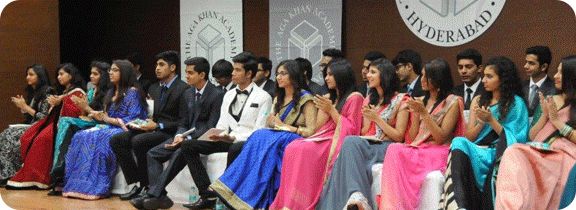
International Baccalaureate
The International Baccalaureate (IB) is a non-profit educational foundation, motivated by its mission to create a better world through education. IB programmes for students aged 3 to 19 help develop their intellectual, personal, emotional and social skills to live, learn and work in a rapidly globalising world.
The Aga Khan Academy Hyderabad has been authorised as an IB World School offering the IB Primary Years, Middle Years and Diploma Programmes.
IB World Schools share a common philosophy – a commitment to improve the teaching and learning of a diverse and inclusive community of students by delivering challenging, high quality programmes of international education that share a powerful vision.
Aims of the IB programme
Founded in 1968, the International Baccalureate currently works with schools in 144 countries to develop and offer their programmes to over one million students.
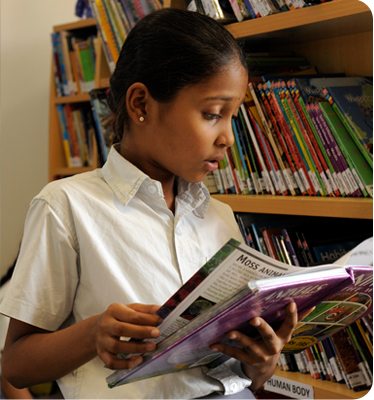 The IB mission statement declares:
The IB mission statement declares:
"The International Baccalaureate aims to develop inquiring, knowledgeable and caring young people who help to create a better and more peaceful world through intercultural understanding and respect. To this end the organisation works with schools, governments and international organisations to develop challenging programmes of international education and rigorous assessment. These programmes encourage students across the world to become active, compassionate and lifelong learners who understand that other people, with their differences, can also be right."
Primary Years Programme
The Primary Years Programme (PYP) at the Academy, for students aged 6–10, focuses on the development of the whole child, addressing social, physical, emotional and cultural needs, while giving students a strong foundation in all of the major areas of knowledge. Through the PYP, children become aware of and sensitive to the points of view of people in other parts of the world.
Middle Years Programme
The Middle Years Programme (MYP), for students aged 11–16, integrates the study of all the major disciplines, including languages, sciences, literature and the social sciences, mathematics, arts, technology and physical education. The MYP normally includes a service component designed to encourage students to become involved with their communities.
Diploma Programme
The Diploma Programme (DP), for students aged 16–19, is a two-year course of study that prepares students for university. All DP students study languages, a social science, an experimental science, mathematics and, usually, an arts subject.
At the same time as it provides a form of academic passport, the DP generally fulfils the requirements of a student's national education system. Each student's performance is evaluated by independent examiners and measured by his or her levels of knowledge and skills relative to set standards applied to all schools.
For further information about the International Baccalaureate and its programmes, please visit the IB website.
